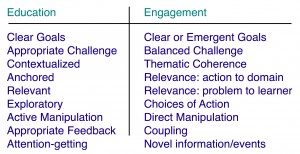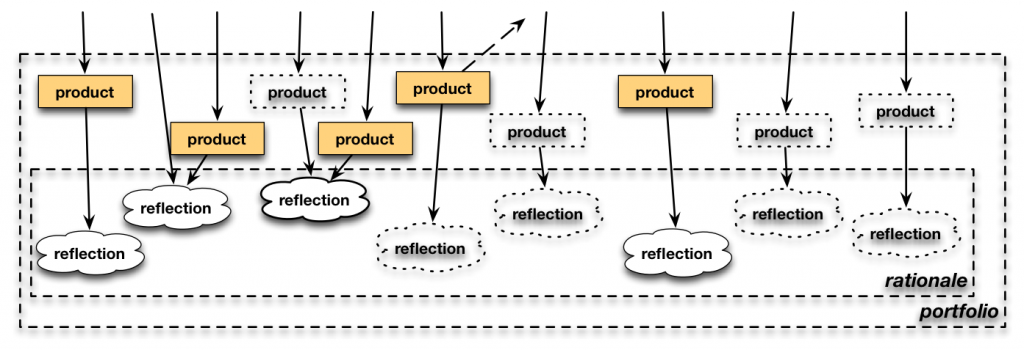Donald Clark (the UK one) generally writes great posts: insightful and irreverent, and consequently fun. I like that he is willing to counter the prevailing wisdom with good research. I hope to someday meet him. However, his recent post against iPads in the classroom seemed to me to miss a couple of points. Not that I fully disagree with him, but that I think that some elaboration might shed some light. Note: I’m starting by focusing on K-6, not middle school or higher ed. He does acknowledge the potential value for young kids, so we’re not quibbling too much, but I still want to make a few points.
He first claims that they don’t support writing. Yes, that’s true, the touchscreen isn’t the same as a keyboard. However, my colleague Scott Marvel has filmed lots of kids with iPads and he tells me they don’t have much trouble using the touchscreen (they’re not highly capable with regular keyboards at young ages), they use speech to text as well, and also take freehand notes too. So writing isn’t horribly impeded on iPads for younger kids. Further, writing shouldn’t necessarily be done in the classroom anyway. Learning to type, and heavy writing should be done offline, and shared for feedback in class. It’s a waste of valuable teacher time, when they could be facilitating meaningful engagement.
I also note that he says they don’t work for creative work, and that they should be creating, not consuming. I generally agree on the creation aspect (while noting that flipping the classroom and getting reading and tutorials done at home isn’t bad and the latter isn’t passive consumption), but note that he’s missed one of the big content creation aspects that smaller devices support: taking pictures and filming videos. It may be that iPod Touches are even better for K-6, but running around and filming with a tablet (particularly an iPad mini, which may be optimal for K-6) is better than a laptop. And I’ll bet that the video and photo editing tools on tablets are just the simple tools that kids really need; they just need basic capabilities.
I note that I didn’t buy my iPad for content consumption: when it was announced I wrote it off for just that reason. However, between the time it was announced and became available, I saw how I would use it to be more productive: creating not consuming. And I bought one the first day it came out for that reason.
Let me also elaborate on the size point. Elliot Soloway many years ago made the point that laptops were the wrong form-factor for young kids, and he started using Palm Pilots. I think it’s still the case that a laptop isn’t right for kids, and that touch screens make much more sense than keyboards and touch pads or mice. There are plenty of people noticing how 2 year olds are able to use iPads!
Donald also talks about coding, and it is a shame that there isn’t a HyperCard equivalent for the iPad (though Infinite Canvas may be such, tho’ it’d need educational pricing). However, something like Scratch for the iPad would be a real opportunity (precluded by Apple, unfortunately, I wonder if there’s an Android version). And coding K-6 other than scratch doesn’t make a lot of sense.
He says that iPads are problems for teachers, and I’m somewhat sympathetic. However, too often I’ve seen instances where teachers weren’t properly prepared. For instance, something like GoClass (caveat: partner), while still a bit instructivist, could scaffold teachers initially until they began to see the opportunities. And there needs to be mobile management software to deal with the issues. However, I’m hard pressed to believe iPads are any more fragile than laptops.
Now, for higher grades, I take the point. My lad and lass both have MacBook Pros, though they each also have an iPod touch (lad’s is my old iPhone without a sim card) that they use. Note that they do not take the laptops to school in most cases. I think that a nice augment for mobile work, getting out of the classroom (please!) is much better facilitated with a tablet or pocketable (smartphone/PDA) than a laptop. And even for collaborative group work, sharing a tablet is better than hovering around a laptop. If necessary, they could be using a bluetooth keyboard when needed. So while I know this is hard to justify on a cost basis, I’d probably argue for an iPad or pocketable for class, and a desktop or laptop for home.
Less related, he makes the side claim that employees don’t use iPads. I’m amazed at the number that turn up at workplace learning conferences, and in meetings. They seem pretty ubiquitous, so I don’t buy this claim. Yes, they may be older, and some folks are using netbooks or MacBook Airs, but I see plenty of folks with iPads equipped with keyboard cases. I keep a bluetooth keyboard for when I’m cranking (e.g. writing on an airplane), but frankly just for quick notes the touchscreen keyboard works good enough for meetings, and that ‘all day’ battery really makes a difference.
And I’ll add on one other benefit for mobile devices: the ability to do contextual work. These devices can be context aware, and do things because of where you are. This is yet to be really capitalized on, but provides a real opportunity.
I think tablets are only going to get more capable, and already make more sense in the classroom than laptops. Teachers should be seeing how to use them, even at higher levels, and save the high-powered writing and editing out of the classroom. Laptops make sense for learners, but not in the classroom. In the classroom, smaller and more versatile devices make more sense.


